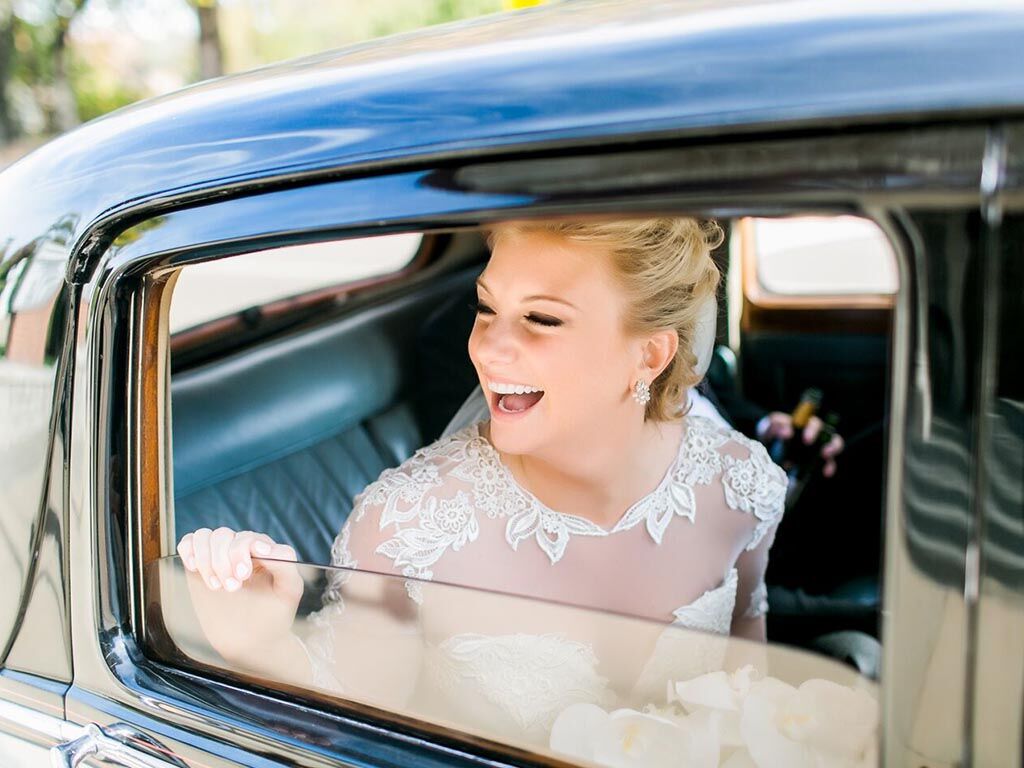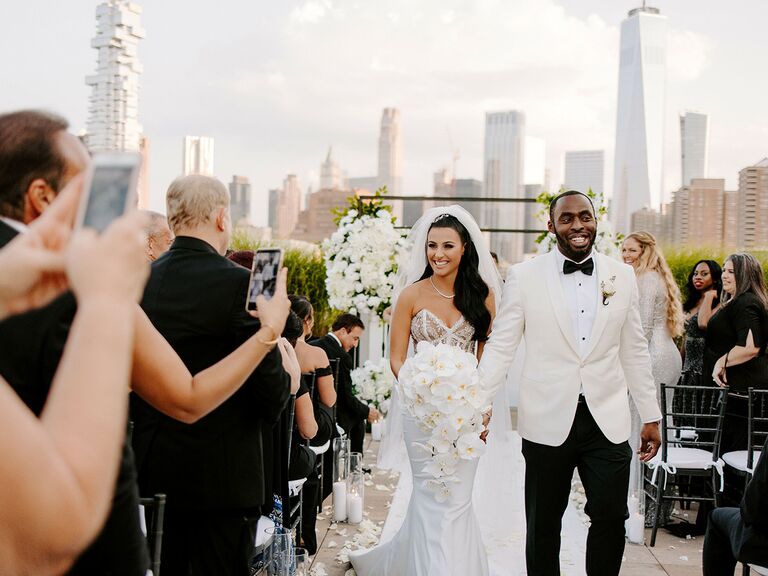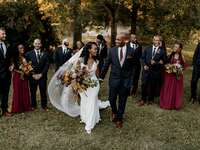Everything You Need to Do During the First Week of Wedding Planning
Whether it's been a couple of months, a couple of weeks or a couple of days since the proposal, there will come a point when you're ready to start wedding planning for real. While this is certainly an exciting time, it may feel pretty overwhelming. You may be tempted to try to tackle your entire wedding checklist at once, but as the old saying goes, slow and steady wins the race. Taking things one step at a time can not only make the planning journey more straightforward, but it can also help avoid overspending (which is actually really common!). So what do you do first when planning a wedding? Here's a step-by-step guide to exactly what you'll need to do during the very first week of wedding planning.
1. Choose a wedding location.
First things first: You and your partner need to decide where you're hosting your big day. We're not talking about a specific wedding venue (that comes later!), but the general location (city, state, country, etc.). You may want to marry in your hometown or the city where you currently live, or you might consider a destination wedding, whether it's a short drive or a long flight away. There are pros and cons to each time to wedding location, so this is definitely a big decision.
2. Figure out who's paying.
Before you can start truly planning your wedding, you'll need to know how much you have to spend. And even before that, you'll need to know who's contributing to your wedding budget. Remember that whoever contributes financially to the big day also gets a say in the planning process—so if you and your partner want full control, paying for your own wedding yourselves might be your best option (if it's doable financially). If you're asking your parents or others to help pay, now's the time to have that conversation.
3. Set a budget.
Once you know who's paying, it's time to figure out your total wedding budget. While the average cost of a wedding in the U.S. is about $30,000, it varies widely depending on where you're getting married. Take the time to do some research about how much a wedding costs in your chosen location. Then, work with your financial contributors to decide on a total lump sum you can spend on your wedding day. Once you have that number, it's a good idea to use an online budget tracker to ensure you stay organized and on track.
4. Pick your priorities.
While there is a standard budget breakdown that divides your total sum among all the wedding vendors, products and services you'll need for your special day (fun fact: about half of your budget will go toward your venue and catering!), you may want to spend more in certain areas and less in others. Sit down with your partner and choose three areas where you're willing to splurge, and three others that are less of a priority. For some couples, the wedding photographer, videographer and flowers might be of great importance, while for others, it might be food, music and a wedding dress. Remember that it's totally normal for you and your partner to disagree, so compromise may be involved (good practice for life as a married couple!). Once you're able to come to an agreement, write down your list of priorities so you can refer back to it throughout your wedding planning process.
5. Think about your wedding style.
We're getting to the fun part. It's time to answer the question: How do you want your wedding to look and feel? Take The Knot's Style Quiz to determine your vision for the big day, whether it's classic, rustic, modern, glam, romantic, beachy or something else entirely. Having a general wedding style in mind will be helpful with everything from creating your guest list to choosing a venue. Once you've decided on your vision, you can start saving wedding inspiration and wedding ideas on websites and social media, which will come in handy later on.



6. Estimate your guest count.
No, you don't have to come up with a finalized wedding guest list this early in the planning process. However, we do recommend estimating how many guests you'll invite, as this will help narrow down venue options. You might think you want a small wedding, but when you make a list of all of your must-invite loved ones, it may be bigger than you anticipated! Again, it's important to work with anyone who is contributing financially to the wedding on this, as they should get a say in who's invited.
7. Decide if you're working with a full-service wedding planner.
It may seem a bit early in the process to book a wedding planner, but if you'd like to have someone to help you choose a venue, you'll want to hire a planner ASAP. There are many reasons why hiring an expert wedding planner is a good idea—in short, they'll make your dream wedding a reality (while helping you stay on task and on budget!). There are a variety of different types of planners, from full-service to day-of coordinators, so be sure you choose the right one for your needs.
8. Narrow down some wedding dates.
Next on the wedding planning checklist? Time to start thinking about dates. This isn't about choosing the exact date of your big day (although if you have a special wedding date in mind, go for it!), but narrowing down the calendar to select a few dates that will work for you and your loved ones. The average engagement length is 16 months, which should give you plenty of time to plan. If you want to get married, like, yesterday, a last-minute wedding (six months or less) is totally possible—but you'll have to be flexible with dates, venues, and vendors.
9. Start thinking about your wedding party.
The wedding party has a major role during the planning process, from putting together the bachelor/bachelorette party, shower and more, to standing by your side on the big day. You'll want to choose your bridesmaids, groomsmen, best man, maid of honor, bridesmen, groomsladies, ring bearers, flower girls and more with enough time so they can start performing their duties. Usually, these roles are given to the couple's close friends and family members, so start thinking about whom you'd like to include in your VIP crew (and plan the proposal!).
10. Start researching wedding venues.
All of the decisions you've made thus far lead to this step. While we certainly don't expect you to find the perfect wedding venue during your first week of planning, it's a good idea to start researching. First, you'll want to decide if you're having your wedding ceremony and reception in the same space or in different locations (for example, the ceremony at a house of worship followed by a celebration at separate reception venue). Then, check out The Knot Marketplace to find venues in your area. If you're motivated, you can start reaching out to venues and scheduling tours right away.
11. Create a wedding registry.
You'll be surprised at how many people ask you if you've set up your wedding registry days after your engagement. Your loved ones will want to buy you engagement gifts ASAP, so it's never too soon to set up your registry. The Knot Registry makes this process a snap, plus, your registry will sync up with your wedding website (you'll create that soon) so your guests can easily find all the details.





















